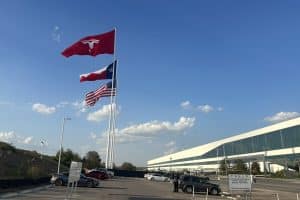- ⚙️ Majority of workers at Mercedes-Benz U.S. International (MBUSI) factory in Tuscaloosa, Alabama, have signed up for the United Automotive Workers (UAW).
- 🏭 The union drive extends to non-unionized automakers like Volkswagen, Toyota, and Tesla across the U.S.
- 💰 Issues cited for the union drive include stagnant wages, a two-tier wage system, and alleged mistreatment of temporary workers.
- 📢 Mercedes worker Jeremy Kimbrell emphasizes workers’ agency in deciding to unionize and addresses potential opposition from the company and politicians.
- 🚗 The Tuscaloosa Mercedes plant produces various Mercedes-Benz models, including electric ones, and is significant in Alabama’s automotive industry.
- ⏳ The UAW previously led a successful strike against major automakers and is now expanding unionization efforts to other automakers with U.S. facilities.
- 🤝 UAW President Shawn Fain aims to negotiate with major automakers, including those outside the “Big Three,” when contracts expire in 2028, emphasizing solidarity among autoworkers.
In recent years, there has been a notable shift in the landscape of the automotive industry, particularly in the realm of labor relations. A significant development has been the surge in unionization efforts among autoworkers, with the United Automotive Workers (UAW) taking center stage in this movement. Let’s delve into the key aspects driving this trend and its implications.
Understanding the Momentum
The heart of this movement lies in the grassroots efforts of autoworkers who seek to address longstanding issues within the industry. At the forefront of this momentum is the recent news that a majority of workers at the Mercedes-Benz U.S. International (MBUSI) factory in Tuscaloosa, Alabama, have embraced union representation under the UAW. This signals not only a triumph for the workers at MBUSI but also reflects a broader trend across the automotive sector.
Addressing Systemic Challenges
The decision to unionize resonates with a myriad of challenges faced by autoworkers nationwide. From stagnant wages to a two-tier wage system and alleged mistreatment of temporary workers, the grievances are multifaceted. These issues not only impact individual workers but also have broader implications for the industry’s overall well-being and sustainability.
Voices of Empowerment
One of the most compelling aspects of this movement is the empowerment of autoworkers to assert their rights and demand fair treatment. Mercedes worker Jeremy Kimbrell’s statement encapsulates this sentiment, highlighting the importance of workers’ agency in deciding to unionize. Moreover, his acknowledgment of potential opposition underscores the significance of solidarity and resilience in the face of challenges.
Significance of Tuscaloosa Mercedes Plant
The MBUSI factory in Tuscaloosa holds particular significance within the automotive landscape. Producing a range of Mercedes-Benz models, including electric vehicles, this facility serves as a nucleus of innovation and production prowess. Its embrace of union representation further solidifies its role as a beacon of progress within Alabama’s automotive industry.
Broader Implications and Future Prospects
Beyond the confines of individual factories, the rise of unionization carries broader implications for the automotive industry at large. The UAW’s successful track record, including a historic strike against major automakers, underscores its capacity to effect meaningful change. With plans to expand unionization efforts to other automakers, including non-unionized giants like Tesla and Toyota, the future promises continued momentum towards fair labor practices and collective bargaining.
Conclusion
In essence, the rise of unionization in the automotive industry represents a pivotal moment in the ongoing quest for equitable labor practices. It underscores the power of collective action and the resilience of autoworkers in pursuing a better future. As the movement gains momentum, it is imperative to recognize the significance of this shift and support efforts towards a more just and sustainable automotive industry.




